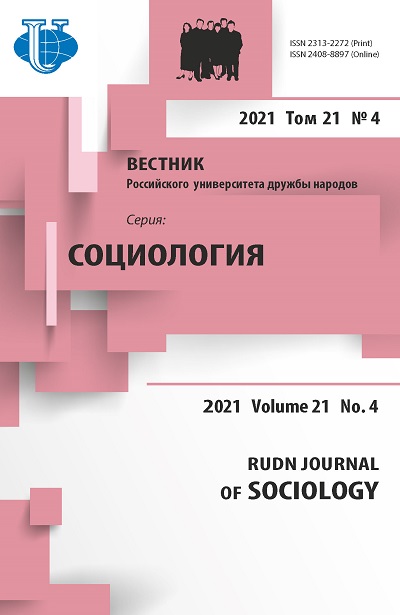Everyday people’s patriotism in Russia: Possibilities and limitations of sociological study and typologization
- Authors: Trotsuk I.V.1,2
-
Affiliations:
- Russian Presidential Academy of National Economy and Public Administration
- RUDN University
- Issue: Vol 21, No 4 (2021)
- Pages: 891-902
- Section: Reviews
- URL: https://journals.rudn.ru/sociology/article/view/29626
- DOI: https://doi.org/10.22363/2313-2272-2021-21-4-891-902
Cite item
Full Text
Abstract
The article is a review of the book by K. Clément Patriotism from Below. “How Is It Possible That People Are So Poor in the Rich Country?” (Moscow: NLO, 2021. 232 p.). The book is based on the results of the research project aimed at the detailed description of different types of everyday Russian patriotism with the help of the qualitative approach (in fact, case studies and semi-formalized interviews were conducted, although the book presents them as ethnographic research and in-depth interviews). The book identifies and describes the following types of the ‘grassroot’ Russian patriotism which does not always coincide with the state patriotic discourse (patriotism ‘from above’): non-state and state everyday patriotism, non-patriotism, detached patriotism, and local patriotism. The review identifies both the undoubted merits of the book and its conceptual, methodological and analytical limitations which can become a starting point for further sociological studies of discursive practices and behavioral patterns of Russians, especially of those living in the Russian ‘hinterland’ (depressed peripheral regions of the country).
About the authors
I. V. Trotsuk
Russian Presidential Academy of National Economy and Public Administration; RUDN University
Author for correspondence.
Email: irina.trotsuk@yandex.ru
доктор социологических наук, профессор кафедры социологии Российского университета дружбы народов; ведущий научный сотрудник Центра аграрных исследований Российской академии народного хозяйства и государственной службы при Президенте Российской Федерации; ведущий научный сотрудник Центра фундаментальной социологии Научно-исследовательского университета «Высшая школа экономики»
Vernadskogo Prosp., 84, Moscow, 119571, Russia; Miklukho-Maklaya St., 6, Moscow, 117198, RussiaReferences
- Андерсон Б. Воображаемые сообщества. Размышления об истоках и распространении национализма. М., 2001.
- Божков О.Б. Троцук И.В. Постсоветский фермерский интернационал в сельском хозяйстве Северо-Западного региона // Крестьяноведение. 2020. Т. 5. № 4.
- Даль В. Толковый словарь живого великорусского языка. М., 1978. Т. 3.
- Добролюбов Н.А. Русская цивилизация, сочиненная г. Жеребцовым // Собрание сочинений в 3-х тт. М., 1986. Т. 1.
- Менделеев Д.И. К познанию России. СПб., 1907.
- Страусс А., Корбин Дж. Основы качественного исследования: обоснованная теория, процедуры и техники. М., 2001.
- Таршис Е.Я. Контент-анализ: принципы методологии (Построение теоретической базы. Онтология, аналитика и феноменология текста. Программы исследования). М., 2014.
- Таршис Е.Я. Перспективы развития метода контент-анализа // Социология: методология, методы, математическое моделирование. 2002. № 15.
- Тичер С., Мейер М., Водак Р., Веттер Е. Методы анализа текста и дискурса. М., 2009.
- Толстой Л.Н. Патриотизм и правительство // Полное собрание сочинений в 90-та тт. М., 1958. Т. 90.
- Троцук И. Дискурсивное конструирование социальной реальности: концептуальные основания и эмпирические приемы разоблачения «скверных» практик // Социологическое обозрение. 2014. Т. 13. № 2.
- Троцук И.В. «Вторая Россия»: форматы «обнаружения» и дискурсивной презентации // Пути России. Новые языки социального описания. М., 2014.
- Троцук И.В. Текстовый анализ в социологии: проблемы и обещания разных типов «чтения» слабоструктурированных данных. М., 2014.
- Филипс Л.Дж., Йоргенсен М.В. Дискурс-анализ. Теория и метод. Х., 2004.
- Charmaz K. Constructing Grounded Theory: A Practical Guide through Qualitative Analysis. Thousand Oaks, 2006.
- Fairclough N. Critical discourse analysis and the marketization of public discourse: The universities // Discourse & Society. 1993. № 4.
- Fairclough N. Media Discourse. L., 1995.
- Miller S.I. How does grounded theory explain? // Qualitative Health Research. 1999. Vol. 9. No. 4.














